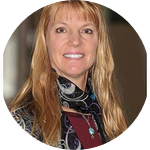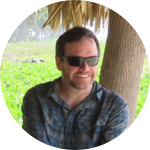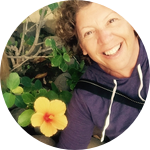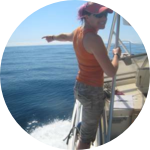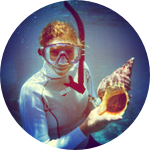Project Results
Tagging Hawaiian Humpback Whales: Assessing Approach Methods to Gather Social Sounds and Expand Ethogram Data
Ann Zoidis, Maren Anderson, Kate Lomac-MacNair, Kerri Seger, Andrew Day, and Thomas F. Norris
Poster
About This Project
At Cetos Research Organization we specialize in underwater video of Hawaiian humpback whales. We are the scientist team that discovered calves make sounds. Now we're back to create a cheap tag (~$300) to track humpbacks. Our prototypes worked last season; now we need to make more and field test them. We can track humpback movements above and below water and map these movements to behaviors or calls also recorded on video. We share our results with policy makers to help protect humpback whales.
Ask the Scientists
Join The DiscussionWhat is the context of this research?
At Cetos we've studied humpback whales since 1992; the Hawaii project is our "baby" with a focus on mother-calf behaviors/sounds. We're an incredibly scrappy team making an incredible impact. Cetos operates on a shoestring budget, all our scientists volunteer time and expertise with tag design support from BioWaves.
Before we started collecting underwater video, the scientific community (even textbooks) stated calves don't make any sounds. From our research, we wrote the first scientific paper proving humpback calves make calls! Then ours was the first data on male vs. female calves develop behaviors differently!
We're excited for our next phase: linking tagging and video. Scientists still don't know what social sounds mean or what whales are "saying". Our boat may have room for you!
What is the significance of this project?
Humpbacks are federally endangered. That mandates information gathering for the advancement of their management practices by the U.S. Government. And oceans are changing with climate change, plastics pollution, etc.Our goal is to help conserve this species.
Our data findings contribute understand to the unique natural history characteristics in a sensitive time of year when calves are born and are first growing. We evaluate our information against the backdrop of ever increasing threats posed by human activities and provide important data where it is lacking.
The significance of this specific project is that with a minimum of $6,000 we can perfect this technological advancement and change the way tags are utilized for an entire field of study! This will alter future whale study methods.
What are the goals of the project?
The window to study mother-calf humpbacks is very limited. Mothers are only at our field site a few months. Ideally we'd go this winter or depending on funding we'll go in 2017 to continue to study mothers, calves, their social interactions, behavior, calls, and disturbance reactions.
What's new our next effort is along with BioWaves's help we'll refine our GPS tag design. Last season we were able to build 4 smartwatch tags. We scraped funds together for watches and materials, deployed them on whales, and tested our concept successfully. Our tags were location accurate, got calf calls unique to Maui, and we filmed tagged whales underwater.
We have preliminary data. We need to go again to test our hypotheses in prep for future publications. When we publish, we'll send you a copy!
Budget
We want to make an affordable (~$300) GPS whale tag to advance whale research. Most tags cost upwards of $15k. We have done the initial R&D to prove these low cost tags work. We had the idea for these inexpensive garmin GPS tags during a pre-season planning meeting. Getting them to reliably work in the marine environment and on a whale would be a HUGE advancement for whale tagging studies. $6000 would give us room and board and a boat to get our scientists back out on the water to do the live tag/whale testing as well as money to build another 3 tags and improve the design. You like your apple watch, right? Think of this as an apple watch for whales! This Garmin watch is like one you might use to run with. The watch embedded in a non-invasive tag collects data not unlike a fitbit except instead of the number of steps you walk, it tracks the sounds, movements, diving patterns and more of whales!
For a $1,500 donation you can come join us in Maui: 3 out of 4 spots left
Endorsed by
Meet the Team
Affiliates
Affiliates
Team Bio
What is unique about the Cetos team is we are comprised of old friends, decade-long colleagues, and fellow researchers. The team includes researchers from all over the country, many of whom are fellows at Universities and bring their own technical expertise to the work such as Tom Norris of BioWaves who is assisting with the tag R&D. Tom and Ann have worked together for almost 25 years, and BioWaves specializes in marine bioacoustics research and technologies.
Cetos Research Organization Website
Ann Zoidis
Ann Zoidis founded the Cetos Research Organization in 2003. The mission of this 501(c)3 non-profit is to conduct original research mainly on marine wildlife species but also other wildlife, and then through our findings augment conservation and management of animals. We study endangered whales, porpoise, and other federally protected species about which little is known. With almost 30 years of experience as a field researcher, wildlife biologist, and marine mammal scientist, she has directed field research all over the country. When not the Principle Investigator (PI), Ann has worked as a researcher with organizations including Allied Whale, University of Hawaii, BioWaves, New England Aquarium, and others. Over the last 15 years, Ann has been observing and collecting data on humpback whales underwater. She has a great understanding of their behaviors, stressors, and how to approach them in the least invasive and most successful (for collecting data) way. Ann is currently the PI on the National Marine Fisheries Service government research permit to study humpbacks in Hawaii, and is also a Hawaii State Permit holder for humpback whale research. Ann authored over 8 peer-reviewed publications including “Vocalizations produced by humpback whale (Megaptera novaeangliae) calves recorded in Hawai‘i” and “Effects of Sex, Seasonal Period, and Sea State on Calf Behavior in Hawaiian Humpback Whales (Megaptera novaeangliae)”. She has presented at almost every American Cetacean Society conference and Society for Marine Mammology conference since 2003.
Kerri Seger
Kerri graduated from The Ohio State University in 2007 with a combined degree in zoology, ecology, and music education. As a doctoral candidate at the Scripps Institution of Oceanography in bioacoustics, she has mixed these diverse interests by studying humpback whales and the sound environments where they live and communicate. By mapping the percent of time that each sound type exists in Laguna San Ignacio (Mexico), where gray whales mate and give birth, she and her co-authors have found that snapping shrimp and croaker fish are as loud or louder than the boat engines used by fisherman and whale-watchers. At least for now. In Cabo San Lucas, the humpback whales sing so profusely that they are the overwhelming sound source in the ocean, and Kerri's second thesis chapter has found a way to measure how many whales are in an area based on how loudly they are singing. She is also cataloguing the social sound that humpback whales make in order to one day, work on dialect studies for the many populations. To collect these social sounds, Kerri learned to attach suction cup "microphones" to whales. This skill lead to her position on the Cetos team that is now developing the affordable miniGPS tag.
Maren Anderson
Ever since I can remember, I have been fascinated by the underwater world. I began my love of Marine Science in high school when I was certified to SCUBA dive in Belize. Since then, my passion has continued in my studies and my work. I received a Bachelor of Arts degree from University of Colorado at Boulder, in Ecology and Evolutionary Biology with a focus in Tropical Marine Ecology in 2007. I have had the opportunity to perform health assessments of coral reefs in the Caribbean Sea, Gulf of Mexico, and Pacific Oceans, as well as assist in cognitive research of Atlantic bottlenose dolphin and the rehabilitation of West Indian manatees. I joined Cetos Research in 2012 as a research assistant for the Humpback Behavior Project focusing on the interactions between mother and calf pairs. I have participated in vessel- and land-based visual and acoustic towed array surveys, assessing the abundance, density and distribution of marine mammals. These included locations such as Hawaii, the Mariana Islands, and the California coast, where she has studied pilot whales, spinner and bottlenose dolphins, Risso's dolphins, beaked whales, harbor porpoise, California sea lions and harbor seals. On land, I serve as a research assistant and consultant for various government agencies in managing marine resources, specifically in marine mammals and coral. Much of my day-to-today work is taken up as a high school teacher at Drew School in San Francisco, teaching Ecology/Genetics/Evolution and Marine Biology; as well as leading experiential education programs for students around the world.
Kate Lomac-MacNair
My passion for marine and environmental science started at a very young age and intensified while studying humpbacks in Costa Rica, during completion of my BS in Environmental Science (Union Institute & University) with a focus in Cetacean Biology in 2003. I recently received a MSc in Environmental Science and Policy at Johns Hopkins University with a focus on blue whale behavior as observed from aerial surveys in Southern California and have plans to start a PhD program with the University of Algarve in Faro, Portugal in the winter of 2016.
My career has given me over 10 years of field experience in marine mammal research, and monitoring in the United States including Alaska, Hawaii, California, Oregon, Washington, Florida, and the northern Atlantic coast as well as internationally in the Northern Marianas, Costa Rica and Greenland. Projects include monitoring and mitigation and aerial surveys in Cook Inlet, Alaska specific to the endangered Cook Inlet beluga whales since 2007-2015, marine mammal research and observation in the Chukchi and Beaufort Seas during a multi-year baseline study 2008-2012, marine mammal aerial surveys off Southern California 2009-2013 and Puget Sound, Washington 2013-2016 and part of the 2015 Petermann Expedition in Northern Greenland.
I had the fortunate opportunity to begin working with Cetos in 2008 and participated in the 2008, 2010, 2012 and 2015 Maui field seasons. In between those seasons I contributed to our publications, conference presentations , fundraising efforts, and more. Working as both a data collector/processor and an underwater videographer in the field, I assist in data analysis, paper writing and other technical aspects of Cetos research.
Additional Information
We submit that even though we are a small, volunteer based non profit, we are the little engine that could! Cetos Research has made a greater scientific impact and contributions to the field than other large non-profits with unlimited funds and academic connections. We are committed and the Cetos team are dedicated to the mission of education, conservation, and contributing new research.
Project Backers
- 36Backers
- 100%Funded
- $2,500Total Donations
- $69.44Average Donation
